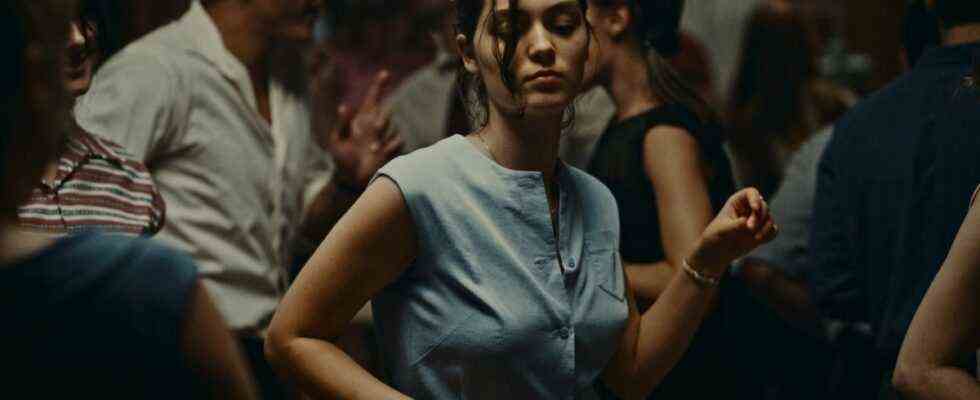A year in which first one director receives the Golden Palm in Cannes and now another one the Golden Lion in Venice has never happened before. The French Audrey Diwan was awarded the main prize of the 78th Mostra on Saturday evening for “L’évènement / Happening” based on the almost autobiographical book “The Event” by Annie Ernaux. Diwan’s film draws its shock moments from the relentless depiction of moments that are absolutely real, but are otherwise discreetly left out.
“L’évènement” played in 1963, the student Anne is pregnant, unwanted, the result of a moment of weakness. When she has the child, all other dreams, her own and those of her parents who struggle to get her to college, will be over. I had a disease, she once says, that only women get and that she condemns to become housewives. Abortions were illegal in France at the time, but, as everyone knows, they took place anyway. When Anne goes to an angel maker, she risks imprisonment, and somehow, of course, the death penalty for her lust. In fact, she almost dies in the process. Audrey Diwan shows her emotional torment, but above all the physical one, which is her only way out, in drastic images that the cinema otherwise does without in matters of abortion. It takes very little to know how much the autonomy of their bodies is in question for women in large parts of the world to believe that Diwan told a story from yesterday. Islamists, right-wingers, also in Europe and the USA, want to restore the very impotence with which Anne faces her future.
The fruits of a creative backlog caused by a pandemic have unfortunately not been seen in Venice
Last year a woman received the main trophy in Venice, Chloé Zhao for her future Oscar winner “Nomadland”. In 2021 there were only four female directors in the competition, but three of them won big prizes. Jane Campion (“Das Piano”) won the directing lion for “The Power of the Dog”, the script award went to Maggie Gyllenhaal for her directorial debut, the Elena Ferrante film “The Lost Daughter”. There will definitely be someone who thinks that the jury preferred women in its decisions. That’s not true. One can rather assume that Paolo Sorrentino only received the Grand Prix of the jury for “The Hand of God” so that there would also be a man among the winners; a woman would perhaps interpret his beautiful, very personal coming-of-age story as too light.
The French director Audrey Diwan with her Golden Lion for “L’évènement”.
(Photo: Domenico Stinellis / dpa)
Campion’s nasty western, in which Benedict Cumberbatch, as the screwed-up cowboy of his sister-in-law, turns life into hell, has a disturbing idea of a happy ending, but it is perfectly staged. In Maggie Gyllenhaal’s “The Lost Daughter”, Olivia Colman struggles with her role as a mother. As Gyllenhaal tells of the ambivalence between love and the burden of responsibility, the wondrous way in which she addresses human weaknesses to her figure, which mothers are commonly denied without judging them – that is actually worthy of the award. Actually, the decisions of the jury, based on the entire competition, are obvious.
Almodóvar’s film “Parallel Mothers” deserves more than just the Actor Award for Penélope Cruz
Because really seriously: The fruits of a creative backlog caused by a pandemic could not be seen in Venice, and parts of the world cinema were missing – no Korean film, no Lebanese, no Iranian, no competition entry from China. There have been cases of rotation due to Corona, but in some places the censorship is simply getting tougher. Still, there were a few films that would have been eligible for a prize. The Polish competition entry “Leave no Traces” by Jan Matuszynki, for example, which deals with how the regime corrupted the judiciary in 1983. And hardly anyone would have complained if Almodóvar’s “Parallel Mothers” had been given more consideration than the Coppa Volpi for the best actress for Penélope Cruz.
But there were a few very half-baked projects in the competition, which one would have wished that their creators would have used the break forced by Corona for a few fundamental thoughts. Does Gabriele Mainetti really think it is tasteful to mix Nazi atrocities with fireflies and clowns in his strange circus superhero film “Freaks Out” – a kind of “X-Men” for amateurs? Did it never bother Damiano and Fabio D’Innocenzo that their “America Latina” outrageously psychologized a man without admitting a single word to the chained girl in his basement? Did the Ukrainian Valentyn Vasyanovych never wonder what the extremely stylish equipment in his film “Reflection” says about his characters? Or Erik Matti, whose lead actor John Arcilla won the actor’s award for “On the Job: The Missing 8” about corrupt politicians and police violence in the Philippines, how many split screens a single film can handle?
There are good reasons why these films have contributed to the suspense of this festival, festivals should reflect trends. A film selection is always shaped by the person who made it – but you can’t find twenty films that come from different countries and still relate to one another if there isn’t actually a trend. In Venice you could see that the deepening rifts that cut through societies also affect cinema, that the shaky and fallen democracies are taking their toll on the stories.
Only one film, “Il Buco”, a silent, documentary-looking piece about a cave expedition in the sixties – awarded a special prize – remained very calm at every moment and splashed along gracefully. Otherwise, the competition looked as if there was a race for shock moments and an inflation of violence – torture scenes, beheadings by the dozen, abortion, horror films. The images become harder and more striking, the gods of slaughter have a firm grip on the cinema. If the canvases really reflect where we are – then the world is out of joint.

